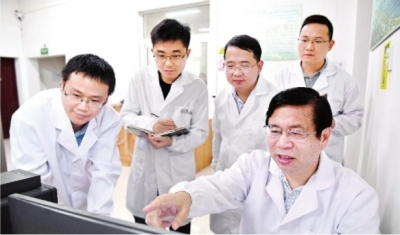CUG committed to landslide research for seven decades

Professor Tang Huiming (R1) and his teammates working on collecting the data of rock mechanics in their laboratory at the China University of Geosciences. [Photo provided to chinadaily.com.cn]
Tang Huiming, a chief professor in the field of geological engineering at the China University of Geosciences (CUG), has been committed to the study of the transformation and process control of landslides for over three decades.
It is difficult for scientists at home and abroad to predict geological disasters like landslides because relevant geological structures are extremely complicated. Therefore, the prediction of geological disasters used to rely heavily on historical experiences.
Meanwhile, geological disasters have caused great casualties and enormous property loss in China, especially in Hubei province. Statistics show that landslides account for over 70 percent of reported geological disasters in the country each year, and that about 660,000 people and property worth 4.94 million yuan (about US$ 694,100) are at risk of geological disasters in Hubei.
As a team leader in the research of the transformation mechanisms and governance of landslides at the CUG, Tang has worked with his teammates to incorporate their cross-discipline knowledge in the fields of geological engineering, hydrological data, mechatronics and computer sciences into the systematic study of landslides.
Tang stressed that it is of vital importance to make forecasts and undertake the prevention and control of landslides, as the implementation of many national development strategies has further highlighted the contradiction between human engineering activities and the geological environment.
He has attached great importance to the studies of the fundamental mechanisms behind the occurrence of landslides at the beginning of the establishment of his research group.
Tang and his teammates have independently developed many intelligent monitoring facilities and an integrated surveillance system toward landslides, and have adopted modern scientific technologies, such as satellite remote sensing, drone photography and sensor monitoring, to comprehensively trace the transformation characteristics and data of landslides in multiple scenarios.
Li Changdong, a member of Tang's research group, said that their predictions on landslides has principally evolved around the prevention of landslides and the minimization of relevant losses.
Tang said that there have been five generations of people at the CUG who have participated in the research of geological disasters since its establishment in 1952. He added that the history of geological disaster research at the university can be traced back to Yan Tongzhen, his academic supervisor and the founder of geological engineering disciplines.
The past seven decades have also witnessed the dramatic development of research facilities at the CUG.
Teachers and students at the CUG have provided the Three Gorges Reservoir area with fundamental and long-term observation information in the prevention and control of geological disasters. Their research results have also been widely applied in national large-scale projects, including the Three Gorges Reservoir, the Baihetan Hydropower Station and the Sichuan-Tibet Railway.






